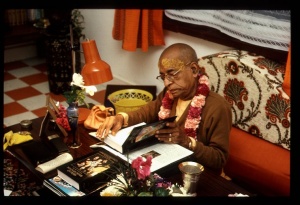CC Madhya 13.146: Difference between revisions
No edit summary |
(Vanibot #0054 edit - transform synonyms into clickable links, which search similar occurrences) |
||
| Line 19: | Line 19: | ||
<div class="synonyms"> | <div class="synonyms"> | ||
''tomāra'' | ''[//vanipedia.org/wiki/Special:VaniSearch?s=tomāra&tab=syno_o&ds=1 tomāra]'' — Your; ''[//vanipedia.org/wiki/Special:VaniSearch?s=ye&tab=syno_o&ds=1 ye]'' — that; ''[//vanipedia.org/wiki/Special:VaniSearch?s=anya&tab=syno_o&ds=1 anya] [//vanipedia.org/wiki/Special:VaniSearch?s=veśa&tab=syno_o&ds=1 veśa]'' — ''different dress; ''[//vanipedia.org/wiki/Special:VaniSearch?s=anya&tab=syno_o&ds=1 anya] [//vanipedia.org/wiki/Special:VaniSearch?s=saṅga&tab=syno_o&ds=1 saṅga]'' — other associates; ''[//vanipedia.org/wiki/Special:VaniSearch?s=anya&tab=syno_o&ds=1 anya] [//vanipedia.org/wiki/Special:VaniSearch?s=deśa&tab=syno_o&ds=1 deśa]'' — other countries; ''[//vanipedia.org/wiki/Special:VaniSearch?s=vraja&tab=syno_o&ds=1 vraja]-[//vanipedia.org/wiki/Special:VaniSearch?s=jane&tab=syno_o&ds=1 jane]'' — ''to the inhabitants of Vṛndāvana; ''[//vanipedia.org/wiki/Special:VaniSearch?s=kabhu&tab=syno_o&ds=1 kabhu]'' — at any time; ''[//vanipedia.org/wiki/Special:VaniSearch?s=nāhi&tab=syno_o&ds=1 nāhi]'' — does not; ''[//vanipedia.org/wiki/Special:VaniSearch?s=bhāya&tab=syno_o&ds=1 bhāya]'' — appeal; ''[//vanipedia.org/wiki/Special:VaniSearch?s=vraja&tab=syno_o&ds=1 vraja]-[//vanipedia.org/wiki/Special:VaniSearch?s=bhūmi&tab=syno_o&ds=1 bhūmi]'' — the land of Vṛndāvana; ''[//vanipedia.org/wiki/Special:VaniSearch?s=chāḍite&tab=syno_o&ds=1 chāḍite] [//vanipedia.org/wiki/Special:VaniSearch?s=nāre&tab=syno_o&ds=1 nāre]'' — ''they do not like to leave; ''[//vanipedia.org/wiki/Special:VaniSearch?s=tomā&tab=syno_o&ds=1 tomā]'' — You; ''[//vanipedia.org/wiki/Special:VaniSearch?s=nā&tab=syno_o&ds=1 nā]'' — not; ''[//vanipedia.org/wiki/Special:VaniSearch?s=dekhile&tab=syno_o&ds=1 dekhile]'' — seeing; ''[//vanipedia.org/wiki/Special:VaniSearch?s=mare&tab=syno_o&ds=1 mare]'' — they die; ''[//vanipedia.org/wiki/Special:VaniSearch?s=vraja&tab=syno_o&ds=1 vraja]-[//vanipedia.org/wiki/Special:VaniSearch?s=janera&tab=syno_o&ds=1 janera]'' — of the inhabitants of Vṛndāvana; ''[//vanipedia.org/wiki/Special:VaniSearch?s=ki&tab=syno_o&ds=1 ki]'' — what; ''[//vanipedia.org/wiki/Special:VaniSearch?s=habe&tab=syno_o&ds=1 habe]'' — will be; ''[//vanipedia.org/wiki/Special:VaniSearch?s=upāya&tab=syno_o&ds=1 upāya]'' — means. | ||
</div> | </div> | ||
Latest revision as of 21:38, 19 February 2024

A.C. Bhaktivedanta Swami Prabhupada
TEXT 146
- tomāra ye anya veśa, anya saṅga, anya deśa,
- vraja-jane kabhu nāhi bhāya
- vraja-bhūmi chāḍite nāre, tomā nā dekhile mare,
- vraja-janera ki habe upāya
SYNONYMS
tomāra — Your; ye — that; anya veśa — different dress; anya saṅga — other associates; anya deśa — other countries; vraja-jane — to the inhabitants of Vṛndāvana; kabhu — at any time; nāhi — does not; bhāya — appeal; vraja-bhūmi — the land of Vṛndāvana; chāḍite nāre — they do not like to leave; tomā — You; nā — not; dekhile — seeing; mare — they die; vraja-janera — of the inhabitants of Vṛndāvana; ki — what; habe — will be; upāya — means.
TRANSLATION
“The inhabitants of Vṛndāvana do not want You dressed like a prince, nor do they want You to associate with great warriors in a different country. They cannot leave the land of Vṛndāvana, and without Your presence, they are all dying. What is their condition to be?